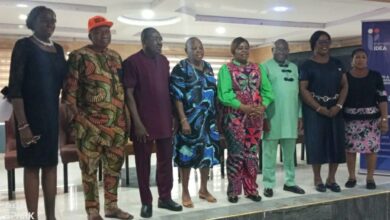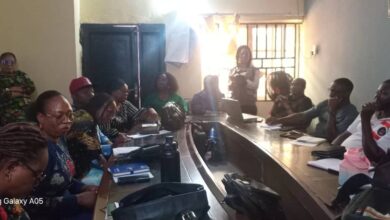Anambra Youths Trained On Catfish Production, Financial Literacy

A 5-day financial literacy training for Anambra Youth led Fish Production Co-operatives has ended in Awka, with the target to ensure stability for Table Catfish businesses.
Angel Network News (ANN) reports that the training is in actualization of the Fish4ACP Catfish Value Chain Upgrading Strategy to shore up the state’s contribution to the production and supply of Table Catfish from Nigeria’s stock to that of the Africa, Carribean and Pacific, ACP.
Thirty (30) fish business owners in the state participated in the training sponsored and organized by the Food and Agriculture Organisation, of the United Nations (FAO-UN) under the FISH4ACP Global Programme covering 12 countries across Africa, Caribbean and Pacific.
The training is an enhancement of the Youths trained on Table Fish Production Business in Anambra State by Fisheries and Aquaculture Business Development Agency, FABDA, the one Youth two skills and the ECOWAS Youth Training on Table Fish Production Business System and Technology.
The service provider for the Financial Literacy training was the Fate Foundation.
Speaking, the Managing Director and Chief Executive Officer of the FABDA in the state, Mr. Emeka Iloghalu, who is also the Focal Person for the State’s relations with the FAO of the United Nations on the Fish4ACP Program, appointed by Governor Chukwuma Soludo, gave an overview of how the training came about.
According to him, the Fish4ACP is a global program being implemented by the FAO, in 12 countries, and for Nigeria, the Catfish Value Chain was selected to be upgraded to become a viable industrialized value-chain.
Iloghalu explained that the reason was because the Africa, Carribean and Pacific, which is the ACP, does not contribute up-to 10 percent of fish to the world.
“So, this program was designed to shore up production and supply of fish from the ACP and for Nigeria, the FAO, first, went about the entire country gathering data on the state of things, to get the baseline for the Catfish activities in Nigeria.
“Anambra was one of the states visited in the Southeast.
“In March 2022, the entire Catfish Value Chain stakeholders were assembled in Abuja, about 120 persons and the data collected across Nigeria was presented for validation and finally, the report came out. In June 2022, 50 persons from across Nigeria were brought together in Lagos, to further plan and develop the strategy to implement the upgrading.
“The planning finished successfully, and the report came out. Eventually, the upgrading strategy was launched in June 2023, after all the works and the implementation began,” he disclosed.
Iloghalu noted that financial literacy was one of the needs identified in the process of implementing the Fish4ACP for Catfish Value Chain Upgrading, revealing that other pilot states across Nigeria are having the same programme simultaneously.
He said the training programme was meant to equip the table Catfish producers with the necessary financial knowledge and tools to be successful and drive the business of Table Catfish production.
“This training makes the efforts we have been making in getting the fish producers to understand the need to run their operations like a business more realistic and they have now become familiar with tenets.
“The financial terminologies as regards to money and business are now clearer to them. So, it makes the job easier for FABDA and the government, because when you are leading and the people do not understand the language of the leaders, there is a disconnect. But now, we are on the same page,” he said.
The President, Aquaculture Value Chain Initiative, AVCI Anambra State, which is the organized private sector for Fisheries and Aquaculture and a multi stakeholder partnership platform, Mr Benedict Ibekie, revealed that 30 fish business operators were selected for the 5-day intensive training, and the participants will afterwards, step down the training.
According to him, the participants are expected to train up to additional 90 operators along the fish value chain to extend the knowledge and impact how fish businesses are run in the state to actualize sustainability.
“We have learnt a lot; recording, how to separate our businesses from our personal finances, which is a major issue for most fish business people, that use the same account for both their businesses and their personal expenses, consequently, they will not know when they mix-up their personal expenditure with their business account.
“We were also taught cash-flow statement, which helps to determine and control cost and expenditure decisions in the course of doing the Fish business and also guides on setting the profit margin. So, it has been a wonderful opportunity and experience for us.
“Also, the state government through FABDA is also supporting the programme because of the impact it is expected to have on the fish businesses. This is because financial literacy is a recurring problem for businesses because many operators do not understand their figures, to know whether they are making progress or not. When one business fails, over a thousand people are discouraged and many will be out of jobs.
“So, when these 30 Catfish businesses and the other cooperatives that will be also trained survive, we will record significant milestones in the Catfish production businesses.
“That way, we shall be creating more wealth and employment, because the value chain businesses that abound will continue to present more opportunities for wealth creation and also enhance food security,” he said.
A fish producer under the Peculiar Table Fish Co-operative Society Ltd, Ukamaka Ifejirika said she is going home, empowered with a lot of knowledge such as record-keeping, setting short-term and long-term goals, insurance policy and separating business account from the personal account.
“This knowledge will help me plan my business and avoid risks that can crash my business. I learnt that in the business, I should be paying myself salary and not delve into my business account to solve personal problems,” she said
The young fish producer expressed the hope that the next training will focus on assisting them secure a reliable insurance company that is working, that they can subscribe to.
She also appealed that further training should throw up opportunities for loans and grants to boost Catfish businesses in the state, regretting that most fish businesses in the state have not been able to secure both Federal and State Government business financing opportunities as a result of low financial literacy levels.





